
The term speech, language and communication needs (SLCN) is commonly used to describe a wide range of issues that make it difficult for children and young people to communicate and interact with others. SLCN is the most common childhood disability in the UK with 10% of pupils entering school with delayed speech or a language development need. Learners with SLCN may have difficulty with stammering, loss of voice, problems producing sounds or using language accurately. They may struggle to express their ideas and communicate their needs. In group settings, they may find it difficult to follow instructions and comprehend non-verbal cues.
This course aims to develop the knowledge, skills and practice of all education professionals working with children and young people (CYP) with speech, language and communication needs (SLCN). You will learn how to assess the needs of a learner and go on to develop a support plan consisting of SMART goals and interventions, which you will implement and later review to determine how well it has met the learner’s specific developmental needs. SLCN is often a feature of other special educational needs so this is a good foundational course to strengthen your capacity to support learners with SLCN and other co-morbidities, such as a hearing impairment and autism.
The course content relates to learners in compulsory education (4-18 years), however, the theory of language development and many of the assessment and intervention strategies can be contextualised and implemented in an early years setting.
This course responds to the information needs of the whole community centred around supporting the child/young person with SLCN. Parents and carers benefit from raised awareness of their child’s needs. Advisory teachers, therapists and educational psychologists gain access to evidence based CPD resources that can be used to strengthen capacity in their local authority and schools. Schools can use this course to train individuals or groups of teachers and teaching support staff as part of a school’s improvement plan or a whole-school initiative. NQTs/RQTs also build a secure knowledge of the graduated approach at the start of their career.
Our courses are structured into four sections. Click on the section headings to reveal page titles and some example content.
Learn about language development and the range of difficulties that learners with SLCN can experience, and the impact on access to the curriculum and/or social inclusion.
- Course aims
- Section objectives
- Terminology associated with speech, language and communication needs (SLCN)
- Facts about SLCN
-
Language and the language environment
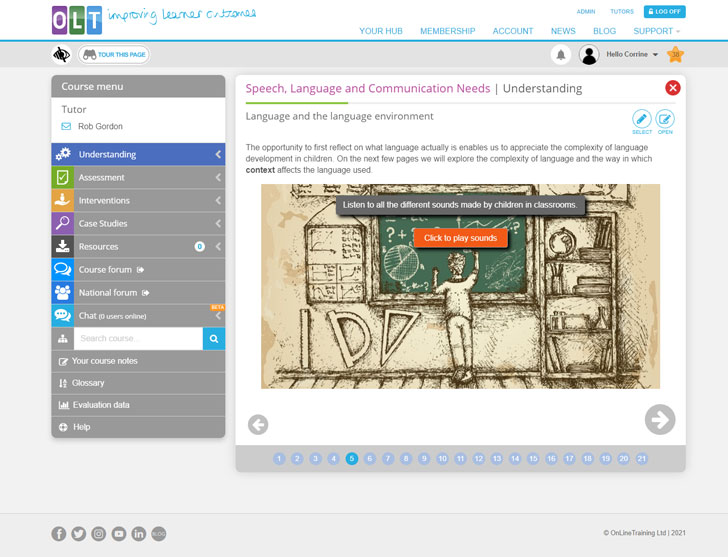
Screenshot from Understanding page 5 - What is language? (Part 1)
- What is language? (Part 2)
- Nonverbal communication
- Reflective Quiz - Key message 1
- Comparing language
- Language in school
- Reflective Activity - Le Prof!
- Components of the language system – receptive and expressive language
- Components of the language system – language processing
-
Language development
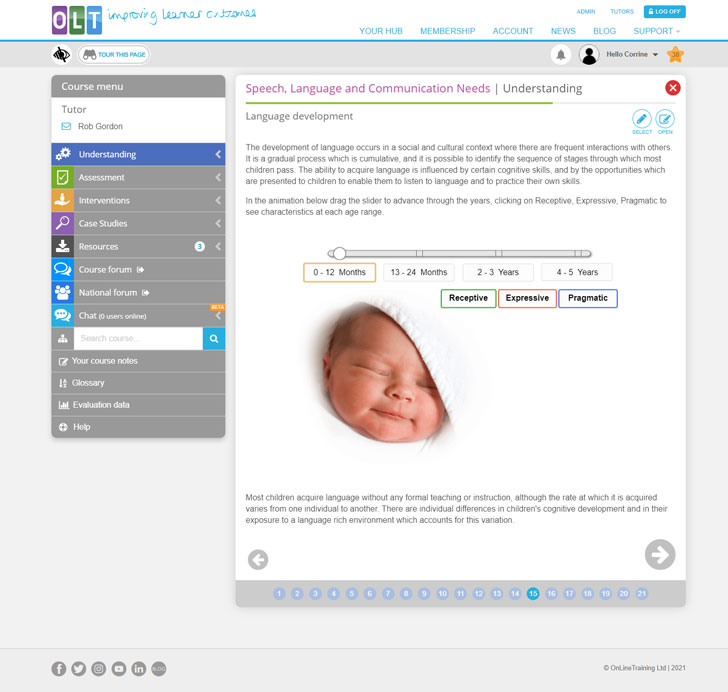
Screenshot from Understanding page 15 - Recognising atypical language development
- Difficulties in receptive or expressive language
- Pragmatics or social use of language or communication
- Impact on key curriculum areas and social inclusion
- End of section quiz
- Section summary
Learn how to assess individual needs, carry out informal assessments and create a picture of the individual strengths and weaknesses of your learner.
- Section objectives and your learner profile
-
The purpose of assessment
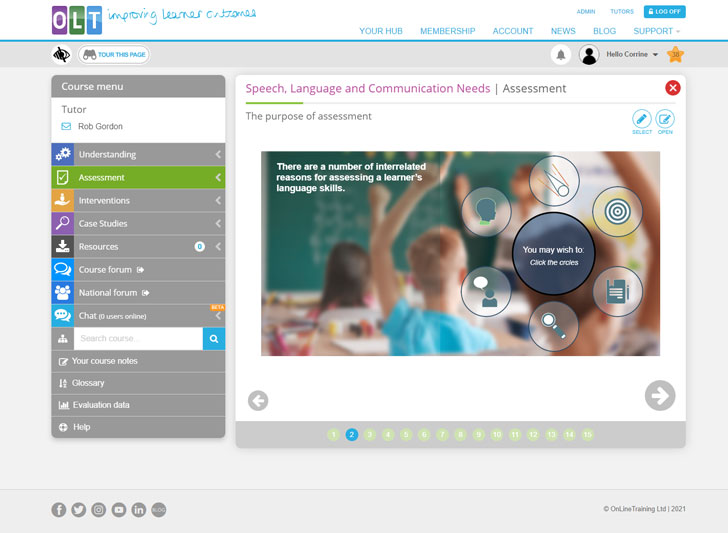
Screenshot from Assessment page 2 - The process of assessment
- Assessment checklists
- Assessing attention and listening
- Assessing the attention to task
-
Assessing expressive language
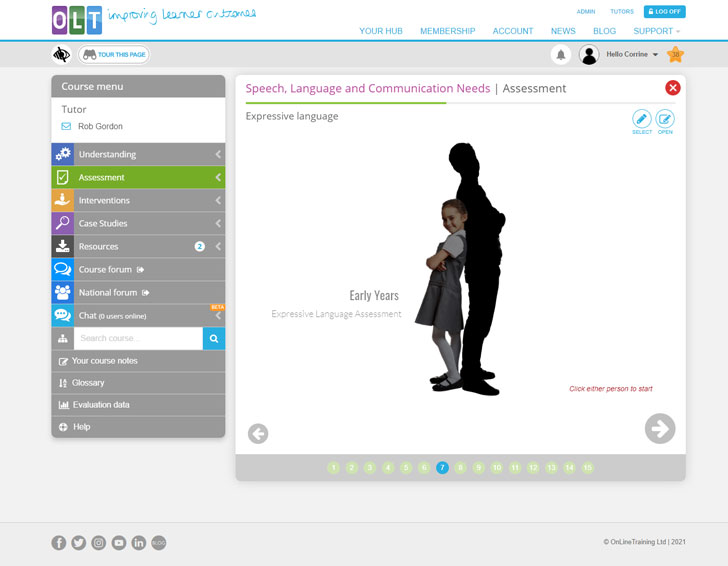
Screenshot from Assessment page 7 - Assessing vocabulary
- Assessing phonological – articulatory skills and fluency
- Assessing social language
- Assessing independent learning strategies
- Observing another adult implement support strategies
- Course assignment: Your learner’s three SMART goals
- End of section quiz
- Section summary
Comprehend a range of strategies to help learners with SLCN and create your own intervention plan to support the needs of your learner.
- Section objectives
- Introduction to intervention strategies
- Strategies to support attention and listening
- Strategies to support the ability to follow instructions
- Strategies to support attention to task
-
Strategies to support curriculum access
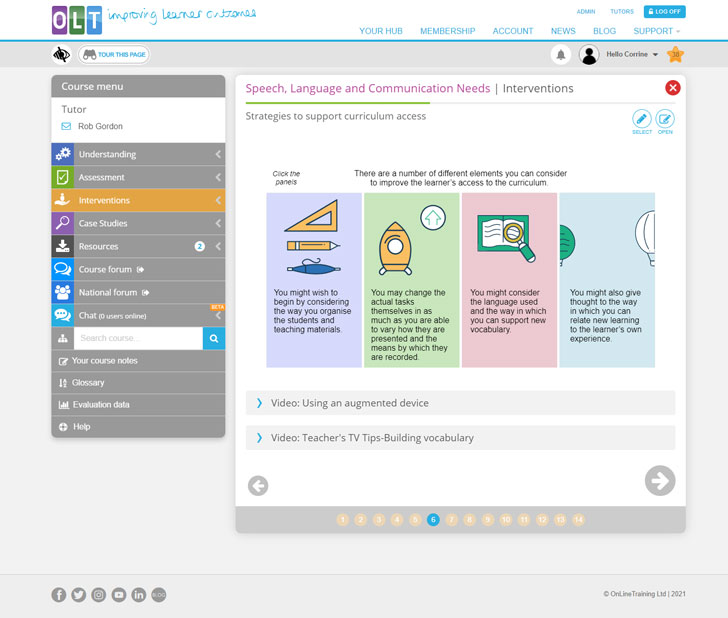
Screenshot from Interventions page 6 - Strategies to support expressive language skills
- Strategies to support grammatical difficulties
- Strategies to support vocabulary acquisition
- Strategies to support the development of phonological and articulation skills
- Strategies to support fluency difficulties
-
Strategies to support difficulties with social language
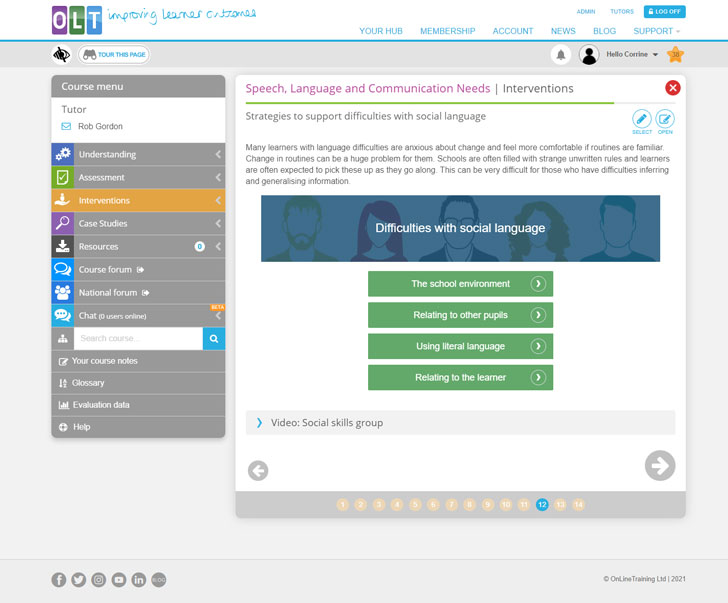
Screenshot from Interventions page 12 - Course assignment: Your learner’s interventions
- Section summary
View videos of authentic learners with SLCN and observe the impact of interventions on their developmental progress.
- Case Study: Gilberto Year 1 (age 6)
- Case Study: Oliver, Year 6 (age 10)
- Case Study: Peter Year 7 (age 12)
Teaching Assistant
Teaching Assistant
Teaching Assistant
Teaching Assistant
Teaching Assistant
Advisory Teacher
Teaching Assistant
Teaching Assistant
Teaching Assistant
Teaching Assistant
Qualified Teacher
Teaching Assistant
Qualified Teacher
Course learning outcomes
On successful completion of the course, you will be able to:
- describe the prevalence and hidden nature of speech, language and communication needs
- differentiate between typical and atypical stages of language acquisition
- identify receptive, expressive and pragmatic language difficulties and evaluate their impact on access to the curriculum and social inclusion
- describe the purpose and process of individual assessments
- use checklists to assess attention, listening, expressive language and fluency skills
- observe and evaluate social use of language and independent learning strategies
- design and plan strategies to support the development of phonological and articulation skills
- create a support plan for a pupil/group of pupils in your school
Ready to get started?
Choose the option that works for you.
Explore our SEND training options - from free courses to whole-school subscriptions.
Sign up now
